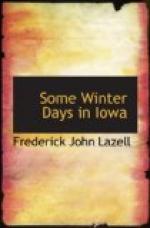marred. States and the nation are setting aside
big tracts of wilderness where rock and rill, waterfall
and canon, mountain and marsh, shell-strewn beach and
starry-blossomed brae, flowerful islets and wondrous
wooded hills welcome the populace, soothe tired nerves
and mend the mind and the morals. These are encouraging
signs of the times. At last we are beginning
to understand, with Emerson, that he who knows what
sweets and virtues are in the ground, the waters,
the plants, the heavens, and how to come at these
enchantments, is the rich and royal man. It is
as if some new prophet had arisen in the land, crying,
“Ho, every one that is worn and weary, come
ye to the woodlands; and he that hath no money let
him feast upon those things which are really rich and
abiding.” While we are making New Year resolves
let us resolve to spend less time with shams, more
with realities; less with dogma, more with sermons
in stones; less with erotic novels and baneful journals,
more with the books in the running brooks; listening
less readily to gossip and malice, more willingly
to the tongues in trees; spending more pleasureful
hours with the music of bird and breeze, rippling
rivers, and laughing leaves; less time with cues and
cards and colored comics, more with cloud and star,
fish and field, and forest. “The cares
that infest the day” shall fall like the burden
from Christian’s back as we watch the fleecy
clouds or the silver stars mirrored in the waveless
waters. We shall call the constellations by their
names and become on speaking terms with the luring
voices of the forest fairyland. We shall “thrill
with the resurrection called spring,” and steep
our senses in the fragrance of its flowers; glory in
the gushing life of summer, sigh at the sweet sorrows
of autumn, and wax virile in winter’s strength
of storm and snow.
* * * *
*
We shall begin our pilgrimages lacking in Nature’s
lore, many of us, as were four men who recently walked
down a city street and looked at the trees which lined
the way. One confessed ignorance as to their
identity; another thought he knew but couldn’t
remember; a third said they looked like maples; and
a fourth thought that silence, like honesty, as the
copybooks used to tell us, was the best policy.
And yet the name linden was writ large on those trees,—on
the beautiful gray bark, the alternate method of twig
arrangement, the fat red winter buds, which shone
in the sunshine like rubies, and especially on the
little cymes of pendulous, pea-like fruit, each cyme
attached to its membranaceous bract or wing.
Of course, if the pedestrians had been in the midst
of rich woods and there found a trunk of great girth
and rough bark, surrounded by several handsome young
stems with close-fitting coats, the group looking
for all the world like a comfortable old mother with
a family of fresh-faced, willowy, marriageable daughters,
every member of the quartet would have chorused, bass-wood.




